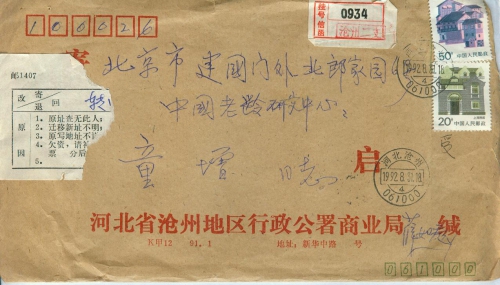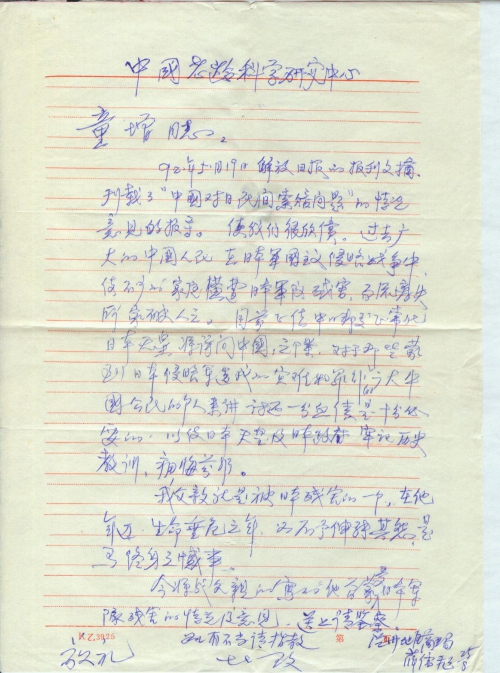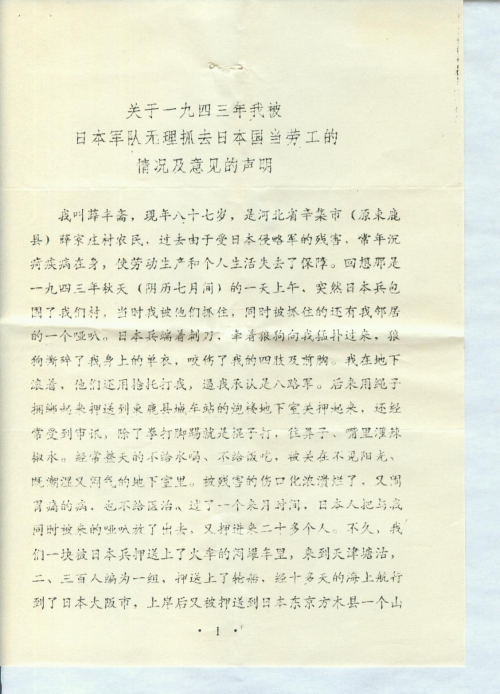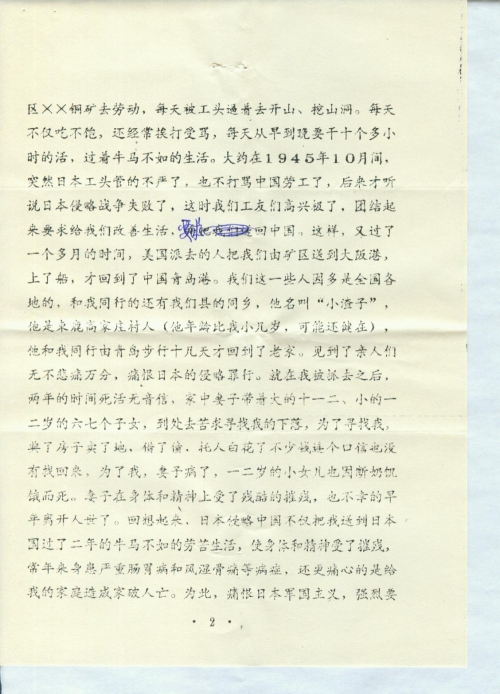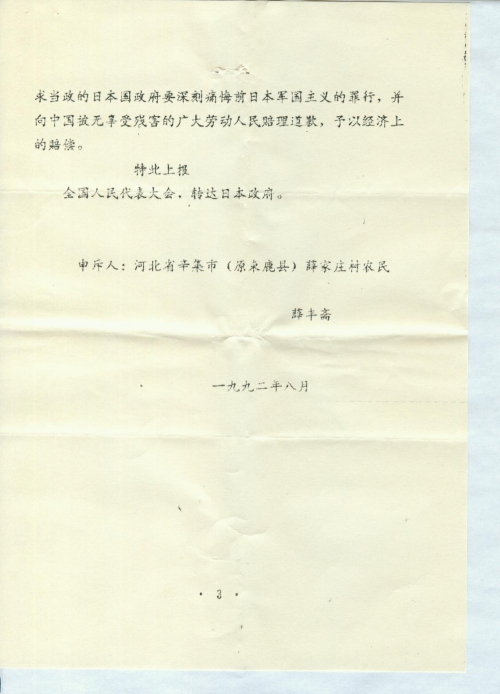Date of letter:1992-08
Address of author:Cangzhou City, Hebei Province
Date of event:1943-1945
Location of event:Xingji (county level city), Shijiazhuang City, Hebei Province
Name of author:Xue Fengzhai
Name(s) of victim(s):Xue Fengzhai
Type of atrocity:Slave Laborers(SL)
Other details:In July 1943 the Japanese Army surrounded our village, I was injured by hounds released by the Japanese Army. Then I was forced by the Japanese Army to admit I was from the Eighth Route Army, and detained, received torture. They poured pepper water into nose and mouth, after one month I was sent to Japan to work as a Slave Laborers. It was not until 1945 that I returned to China.
Comrade Tong Zeng of the China Research Center on Aging:
On May 19, 1992, the Jiefang Daily published a report on “China’s Civilian Claim against Japan” in the “Reader’s Digest” section. We appreciate the report very much. In the past, a vast number of Chinese people suffered greatly during the invasion and occupation waged by the Japanese Militarism; many families lost homes, became destitute and homeless, and lost lives due to persecutions from the Japanese military. At this historical moment of the normalization of Sino-Japanese diplomatic relations, and before the visit of the Japanese Emperor to China, it is really necessary for those Chinese citizens who have suffered from the disasters and crimes brought on by the Japanese Invasion Army to demand repayments for the debt of blood, and to remind the Japanese Emperor and the Japanese government that they must remember historical lessons and repent their past wrong doings.
My father is among those who suffered persecution at the hands of the Japanese Army. At his old and precarious age, it would be a lifelong regret if no efforts were made to publicize his grievances.
Today I send my father’s written description of the persecution at the hands of Japanese Army and his views of the situation to you. Please look into this matter.
Please advise as inappropriate.
Sincerely
with salutation
Xue Rubiao
Lanzhou Commerce Bureau
August 25
A Statement of Circumstances and Views on my capture by the Japanese Army in 1943 to Work as a Laborer
I am Xue Fengzhai, now 89, a farmer in the Xuejiazhuang Village, Xingji City (formerly Shulu County), Hebei Province. Because of the past persecutions by the Japanese Invasion Army, I have been seriously ill throughout the years and have lost the ability to work and maintain a personal livelihood. It was the morning of an autumn day in 1943 (July on the lunar calendar), Japanese soldiers surrounded our village suddenly. and I was captured by them right then. Being captured at the same time included a dumb person who was my neighbor. A Japanese soldier carrying a bayonet and leading a wolfhound rushed toward me; the wolfhound tore away my unlined garment, and bit and wounded my four limbs and my chest. While I rolled on the ground with pain, they clubbed me with the butt of their rifles and coerced me to admit that I was a member of the Eighth Route Army. Later they bounded me with ropes, escorted me to the turret at Shulu County Railway Station, and detained me in the basement. I was interrogated frequently. Besides punching and kicking, they also beat me with clubs, and poured pepper water into my nose and mouth. Often I was given no water and no food for a whole day. I was imprisoned in a humid and stuffy basement without sunlight. The wounds on my body festered. I also developed stomachaches but received no medical treatment. After about one month, the Japanese released the dumb person who was captured together with me, and detained another 20 or so people. Soon afterwards, we were all forced onto a box car by the Japanese soldiers and dispatched to Tanggu in Tianjin. We were then escorted onto a ship in groups of 200 to 300 people. After about a dozen days of voyage on the sea, we arrived at Osaka in Japan. After landing, we were escorted to a mountain copper mine in Tochigi Prefecture near Tokyo, Japan, to work as slave laborers. Each day we were forced by the foremen to work on the mountain and dig caves. Besides inadequate food each day, we were often beaten and abused. Each day from morning till evening we had to work for more than 10 hours and lived a life inferior to that of beasts. Around October, 1945, all of a sudden the Japanese foremen relaxed their control and stopped beating or cursing Chinese laborers. Later, we learned that Japan had lost the war. At that moment, my fellow laborers were overjoyed. We were united in demanding improvements of our living conditions. Above all, we wanted to return to China. In this way and after more than a month, American officers sent us from the mine to Osaka Port where we boarded a ship and returned to Qingdao Port, China. Since we had come from all regions across the nation, only one person who had come from the same county as mine traveled home with me. His name was “Xiaozhazi”, a native of Gaojiazhuang Village, Shulu (he was several years younger than me and may still be alive). We traveled together and walked for over a dozen days from Qingdao before arriving at our hometown. Reunited with our endeared ones, everyone felt sad beyond description. We bitterly hated the Japanese invasion crimes. For two years after my capture, my family and I had no contact or information about each other. My wife took six to seven children ranging from 12-year old to one-year old to look for me. In order to find me, she pawned the house, sold the land, borrowed loans, and spent a small fortune trying to find my whereabouts, all for naught. For this reason, my wife became ill; my one-year old youngest daughter was starved to death due to lack of milk. My wife suffered cruel persecution both mentally and physically, and, alas, passed away early. In retrospection, Japanese invasion into China not only sent me to Japan for two years of hard life that was worse than the lives of beasts, caused me to suffer both mental traumas and physical injuries, induced serious gastrointestinal disease and rheumatism symptoms in me; what’s more heart-breaking is that they destroyed and brought deaths to my family. For this reason, I bitterly hate the Japanese Militarism. I strongly demand the current Japanese government to profoundly repent crimes committed by the Japanese Militarism in the past, to offer apologies to the vast number of innocent Chinese people who had suffered from persecution, and to provide economic reparations to the victims.
The above facts are hereby reported
To the National People’s Congress, and forward to the Japanese government
Claimer: Xue Fengzhai
Farmer of Xuejiazhuang Village, Xingji City (formerly Shulu County), Hebei Province
August 1992














